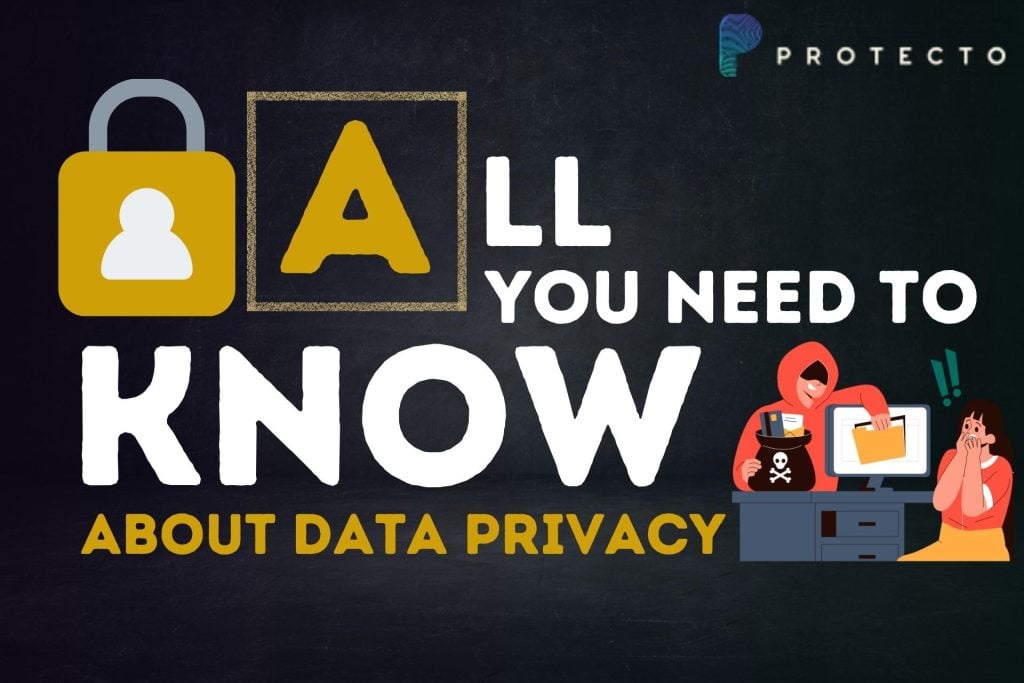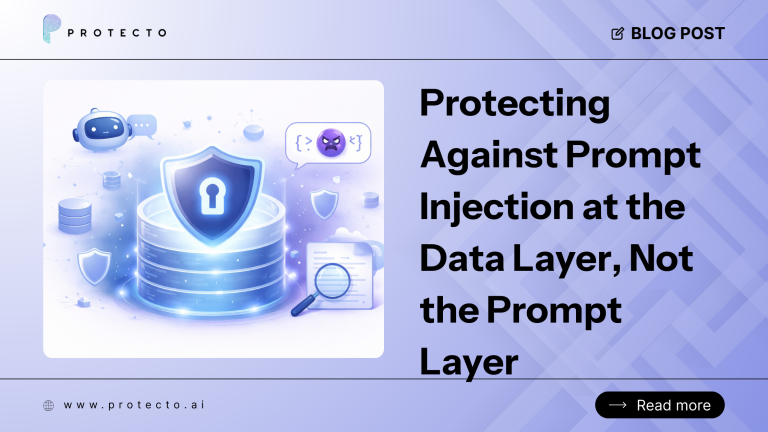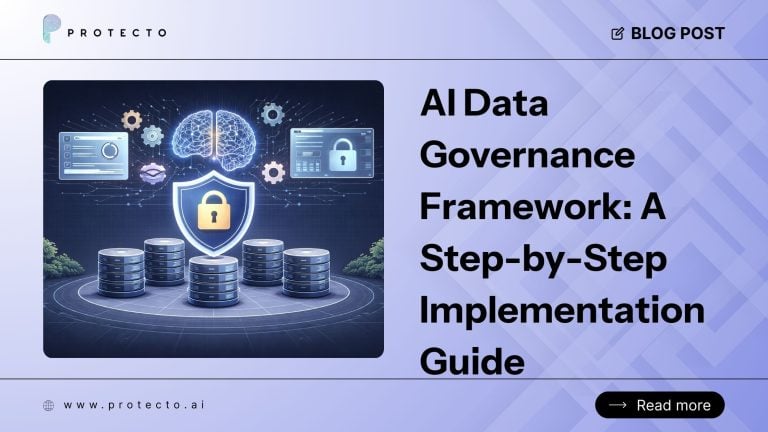Data privacy is something that organizations the world over are concerned about. With major implications being brought over by strict data privacy laws and rising public awareness, organizations must get their data privacy practices in order. Here, we discuss the ins and outs of data privacy and provide you with all the information you need to craft and fine-tune your own data privacy policy.
What is data privacy and why is it important?
Data privacy refers to protecting personal information from unauthorized access and misuse. It involves collecting, storing, and using personal data in a manner that properly respects the rights and freedoms of individuals. Data privacy is important because it helps to protect individuals from identity theft, financial fraud, and other forms of harm that can result from the misuse of personal information.
In today’s digital age, data privacy has become increasingly important as more personal information is collected and stored online. Companies collect customer data for various reasons, including marketing, product development, and customer service. Governments also collect data on their citizens for law enforcement and national security purposes.
While collecting and using personal data can have many benefits, it also raises privacy concerns. If personal data is not adequately protected, it can fall into the wrong hands and be used for malicious purposes.
Data privacy is important because it helps to protect individuals from harm that can result from the misuse of personal information. Companies and governments need robust data privacy policies to ensure that personal data is collected, stored, and used responsibly.
How to protect the privacy of your enterprise data
Protecting the privacy of enterprise data is essential for maintaining customers’ trust and complying with data privacy regulations. There are several steps that companies can take to safeguard the confidentiality of their enterprise data.
One crucial step is to implement strong access controls. This involves restricting access to enterprise data to only those employees who need it to perform their job duties. Access controls can be implemented using various methods, including passwords, biometric authentication, and multi-factor authentication.
Another critical step is to train employees on data privacy and security regularly. This helps employees understand the importance of data privacy and know the company’s policies and procedures for protecting enterprise data.
Regularly backing up enterprise data is also essential for protecting its privacy. Backups can help to ensure that data can be recovered during a security breach or other disaster.
In addition to these measures, companies can also consider implementing network security solutions such as firewalls and intrusion detection systems to protect their enterprise data from external threats. Regularly monitoring and updating these security solutions can ensure that they safeguard enterprise data effectively.
Interesting read: A Complete Guide to Data Privacy Regulations in the US
Data privacy regulations that drive accountability
Data privacy regulations have been put in place to protect the personal information of individuals and to hold companies accountable for how they handle and treat this information. These regulations have given great importance to data privacy by setting guidelines and obligations for collecting, processing, and transferring personal data.
-> General Data Protection Regulation (GDPR)
The General Data Protection Regulation (GDPR) is a regulation in EU law that sets guidelines and obligations for the collection and processing of personal data of individuals in the EU and the EEA. The GDPR aims to give consumers more control over their data and hold companies accountable for handling and treating this information.
Under the GDPR, companies are required to get explicit consent from individuals before starting to collect their data. Companies must also provide individuals with clear information about how their data will be used and allow individuals to access, correct, or delete it.
The GDPR also imposes strict penalties for non-compliance. Companies that fail to properly comply with the GDPR can face fines of up to 4% of their global annual revenue or €20 million, whichever is greater.
-> California Consumer Privacy Act (CCPA)
The California Consumer Privacy Act (CCPA) is a state-level data privacy law that provides California residents with certain rights over their personal information. Under the CCPA, California residents have the right to know and understand what personal information is being collected about them, request that their personal information be deleted, and opt out of the sale of their personal information.
Companies that do business in California and meet specific criteria must comply with the CCPA. These criteria include having annual gross revenues above $25 million or collecting personal information from 50,000 or more California residents.
Global data breaches: Key statistics to watch out for
The recent growth in global data breaches has driven great importance to data privacy. According to statistical data, a total of 108.9 million accounts were reportedly breached in the third quarter of 2022, a massive 70% increase compared to the previous one. The top five countries most affected by data breaches in Q3 2022 were Russia, France, Indonesia, the US, and Spain.
Data breaches can result in sensitive personal information being exposed or stolen. This can lead to issues like identity theft, financial fraud, and other harm. In response to this growing threat, many countries have implemented data breach notification laws that require companies to notify affected individuals when a data breach occurs. These laws help to ensure that individuals are aware when their personal information has been compromised so they can take the appropriate measures to protect themselves.
Also read: Impact of Regulatory Compliance Laws on Data Privacy and Security
Data privacy trends and predictions for 2023
Looking ahead to 2023, several data privacy trends and predictions exist. One direction is that more countries will likely implement data privacy regulations like GDPR and CCPA. This will help ensure that individuals have greater control over their personal information and that companies are held accountable for handling and treating this information.
Another trend is that companies will likely invest more in data privacy technologies such as encryption and tokenization. These technologies can help to protect personal information from unauthorized access and misuse.
Data privacy regulations have given great importance to data privacy by setting guidelines and obligations for collecting, processing, and transferring personal data. The recent growth in global data breaches has further highlighted the importance of protecting personal information. Looking ahead to 2023, we can expect more countries to implement data privacy regulations and for companies to invest more in data privacy technologies.
Best practices for data privacy
Companies can follow several best practices to ensure that they are protecting the privacy of their customer’s personal data. These best practices include conducting regular data audits and risk assessments, using encryption and tokenization as data protection measures, and complying with data privacy regulations and standards.
1. Regular data audits and risk assessment
Conducting regular data audits and risk assessments is an essential best practice for data privacy. This involves reviewing the company’s data collection, storage, and using techniques to identify any potential risks to data privacy. Once these risks have been identified, the company can take steps to mitigate them.
Data audits can help companies ensure that they are collecting only the personal data they need and that this data is being stored securely. Risk assessments can help companies to identify potential vulnerabilities in their data security practices and to take steps to address these vulnerabilities.
2. Using encryption and tokenization as data protection measures
Using encryption and tokenization as data protection measures is another critical best practice for data privacy. Encryption involves converting data into a code to prevent unauthorized access. Tokenization involves replacing sensitive data with a non-sensitive equivalent, known as a token. Both measures can help protect personal data from unauthorized access and misuse.
Encryption can be used to protect data both when it is being transmitted over a network and when it is being stored on a device or server. Tokenization can protect sensitive data such as credit card numbers or social security numbers by replacing this data with a token with no intrinsic value.
3. Complying with data privacy regulations and standards
Complying with data privacy regulations and standards is also a critical best practice for data privacy. Companies should be aware of the data privacy laws and regulations that apply to them and ensure that their practices comply.
In addition to complying with legal requirements, companies can follow industry data privacy standards. These standards provide guidelines for best practices in data collection, storage, and use.
Suggested read: Data Protection Law in India
Frequently asked questions on data privacy
Data privacy is a complex and rapidly evolving field. As such, many people have questions about data privacy and how it affects them. In this section, we will answer some of the most frequently asked questions about data privacy.
What is the role of pseudonymization in Data Privacy?
Pseudonymization is a data protection technique that replaces identifying information with a pseudonym or code. This can help protect personal data privacy by making linking the data to a specific individual more challenging.
Pseudonymization can be combined with other data protection measures, such as encryption and tokenization. It is an essential tool for companies that process personal data for purposes such as research or analytics.
What are the penalties for violating Data Privacy laws and regulations?
The penalties for not complying with data privacy laws and regulations vary depending on the specific law or regulation. For example, under the GDPR, companies that fail to comply can face fines of up to 4% of their global annual revenue or €20 million (whichever is greater).
In addition to financial penalties, companies that fail to comply fully with data privacy laws and regulations can also face reputational damage and loss of customer trust. This can have long-term consequences for the company’s business.
How do companies ensure compliance with Data Privacy laws and regulations?
Companies can ensure compliance with data privacy laws and regulations by implementing strong data privacy policies and procedures. This includes conducting regular data audits and risk assessments, training employees on data privacy and security, and implementing technical measures such as encryption and tokenization.
Companies can also seek guidance from regulatory bodies and industry associations to ensure that their practices comply with applicable laws and regulations.
What rights do individuals have under Data Privacy laws and regulations?
Individuals have several rights under data privacy laws and regulations. These rights vary depending on the specific law or regulation in question but may include the right to access, view, correct, or delete their data; the right to deny consent to the processing of their data; and the right to be informed about how their data is being used.
Individuals can exercise these rights by contacting the company that holds their data and making a request. Companies are required to respond to these requests within a specified timeframe.
Safeguard your sensitive enterprise data with Protecto
In conclusion, data privacy is a crucial issue in today’s digital age. With the ever-increasing amount of personal information being collected and stored online, individuals and companies must take steps to protect this information.
Data privacy regulations provide a framework for collecting, storing, and using personal data. By complying with these regulations, companies can demonstrate their commitment to protecting the privacy of their customer’s data.
Individuals also have a role to play in protecting their data. By being aware of their rights under data privacy laws and regulations and by taking steps to protect their personal information, individuals can help to ensure that their data is treated with the respect it deserves.
With Protecto, you can have a much easier time shielding any sensitive enterprise data. Protecto provides a complete, fully-featured data privacy and security framework that gives you multiple data privacy options, reporting, and compliance assistance. Get in touch with us today to schedule a consultation.



